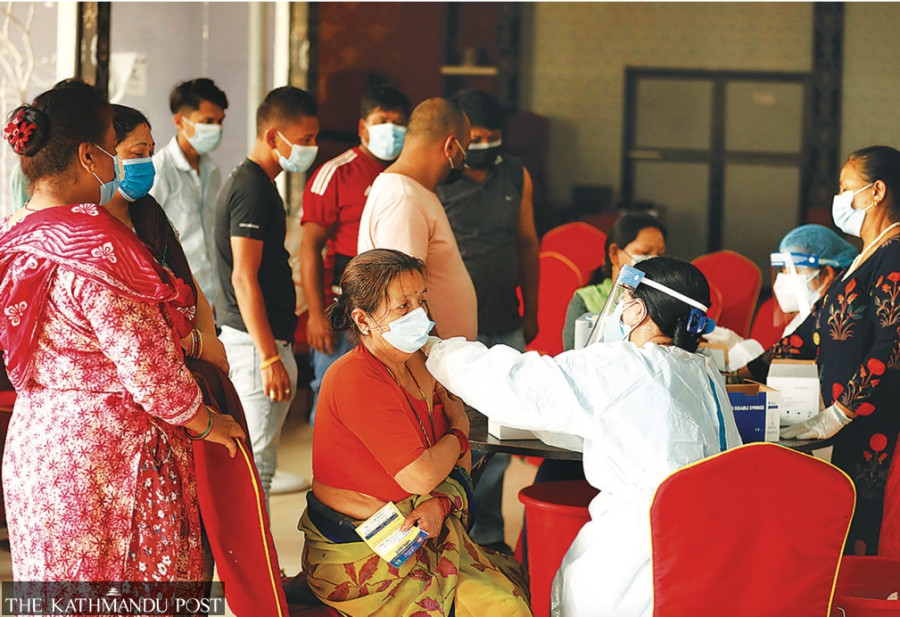Health
Issuing warnings about third wave not enough, experts say
Doctors suspect that immunisation centres are becoming virus-spreading hubs, as the number of people getting infected after 4 to 5 days of vaccination has increased.
Arjun Poudel
A third wave of the Covid-19 pandemic is imminent and unavoidable, public health experts, epidemiologists, virologists as well as the Ministry of Health and Population, all agree.
And Prime Minister Sher Bahadur Deuba is the latest politician to warn the public about the looming third wave.
“It seems that we are on the verge of being hit by the third wave of the pandemic. The efforts by the government alone would not be adequate to control the pandemic,” said Deuba in a video message posted on Twitter. “It would require joint efforts by the government and the people.”
Deuba also requested the public not to go out unnecessarily, wear a mask properly covering the nose and mouth, maintain physical distance, frequently wash hands with soap and water and strictly adhere to all health safety measures.
Public health experts, epidemiologists and virologists the Post talked to said that the appeal by the prime minister to the public is a good thing but that alone would not be sufficient to lessen the possible losses from the third wave.
They asked the government to take substantive measures to lessen infections, purchase vaccines as much as possible, inoculate the masses at the earliest while ensuring that the immunisation centres are not crowded.
“Efforts of the government should be reflected in policy and practice,” Dr Anup Subedee, an infectious disease expert, told the Post. “There is nothing new to recommend. A maximum number of people should get the vaccine at the earliest,
immunisation centres should not turn into infection hubs, and testing and contact tracing should be made effective to break the chain of infections.”
Doctors suspect that immunisation centres are becoming virus-spreading hubs, as the number of people getting infected after 4 to 5 days of vaccination has increased.
Experts say that crowds at immunisation centres can be easily managed by increasing the number of immunisation centres and setting priority for immunisation. They said that authorities concerned should make every effort to immunise the maximum number of people at the earliest and implement the measures to break the chain of the infection.
“The government changed and so did ministers, and the officials responsible for implementing the anti-pandemic policies were also transferred but the government policy against the pandemic remains the same,” Subedee wondered.
“The new government should promote testing, activate mechanisms to make contact tracing effective, make other mechanisms to enforce safety measures and reduce the crowds.”
Public health experts say that increasing testing is the first step to know the infection status in communities. Through testing, the authorities concerned can start other measures of prevention and control, they say
“The government can promote testing by reducing the price of tests or through subsidies,” Dr Tulsi Ram Bhandari, an assistant professor at Pokhara University, told the Post. “It has been almost a month since the new government was formed, but we have not heard anything substantive from it on the pandemic front.”
With the authorities lifting most of the restrictions enforced to control the second wave of the pandemic, everyday life has become almost normal. Public transportation services have resumed, markets and offices have reopened and crowds have increased with people behaving as if there is no pandemic.
The more transmissible Delta and Delta Plus variants of SARS-CoV-2 have been responsible for the ongoing surge in new cases.
More than 3,000 cases have been reported every day since the past week or so.
“Every day around two dozen people have been dying of the coronavirus and over 3,000 are getting infected, “said Bhandari. “These are not small numbers given our population size, and health facilities are already running in full capacity. Authorities should inform the people how many hospital beds have been added and what is the situation of oxygen supply and about other preparations to deal with the third wave.”
On Sunday, 2,137 people tested positive in 9,033 polymerase chain reaction tests, and 411 others tested positive in 2,137 antigen tests performed throughout the country. In the last 24 hours, 55 deaths were reported from across the country and this is the highest number of deaths since June 12.
“Government also has its responsibilities to protect the citizens from infections. For that it has to make every effort to purchase the vaccine at the earliest and inoculate the people,” said Dr Bhagwan Koirala, chairman of Nepal Medical Council, the national regulatory body of medical doctors.
“The general public also has certain responsibilities and they should follow the safety measures properly and other instructions issued by the health authorities until the risk of the infection lessens and the majority of the population gets the vaccine.”
Doctors say people who are helpless and have been religiously obeying the Covid-related instructions of the authorities are still suffering due to government inaction.
“Authorities need to do something visible so that people would believe that the new government is really working to protect them,” said Dr GD Thakur, former director at the Epidemiology and Disease Control Division. “There are several ways to provide relief to the public, win their trust and take them into confidence. Several mechanisms can be created up to the grassroots level to enforce health measures, but for this political will is necessary.”




 16.12°C Kathmandu
16.12°C Kathmandu















